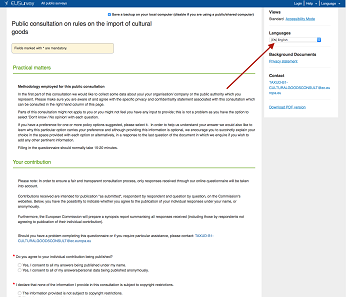by Ursula Kampmann
translated by Annika Backe
January 12, 2017 – Once again, the EU is tightening regulations on the import of cultural goods. To protect itself by democracy, it has placed a survey on the internet that can be accessed in all European languages as of late. Filling it in takes ca. 15-20 minutes, depending on whether you intend to write a detailed commentary. Please don’t hesitate to express your opinion. It’s important that the bodies of the EU realize that the citizen concerned takes an interest in this law.
The survey is not that easy to find, though. As a first step, please access this link:
In the upper right corner, you can choose other languages than English.
The questionnaire can be accessed in the section “How to submit your contribution”.
Now, you have to specify the desired language a second time.
Everything’s ready now. You can choose whether or not you want your contribution to be readable to the public.
Please use the opportunity to make it clear to the EU that this regulation also affects the ordinary collector. Ask your club chairman and your trusted coin dealer to fill in this survey as well, on behest of the club and the commercial enterprise.
If – as in question 3 – there is no mentioning of the most central weakness, namely that third countries do not care about their cultural heritage, tick “Other” and write your statement in the field that will open.
If you aren’t sure of what is meant by a question or if you have no answer, please don’t answer at all.
Take the opportunity to offer “Final remarks” by uploading an additional document.
In this document you may mention, for instance, that it will only strengthen the skepticism of the euro if the ordinary collectors are ignored in the discussion about the import of cultural goods. That you are fed up with the defamations and false information in regards to the art market’s funding of terrorism that keeps wandering like a ghost in the media. That, in order to render measures for the protection of cultural property truly effective, they have to be taken on site, in the third country. And that you, as a collector, are really tired of governments that turn out to be the greatest destroyers of cultural goods, whether through financial and personnel neglect or deliberate falsification of history. You may well emphasize how you, or your club, are involved with the protection of cultural heritage at a practical level, on the other hand.
It might be important to point it out to the EU that in the eyes of the citizens a policy aiming at protecting cultural goods doesn’t win moral credibility through stricter regulations but true commitment – both in terms of funding and personnel.
No matter what you write – it’s vital that you write something, and that you do it before January 23, 2017. Raising our voices is the only way for us to get heard.






